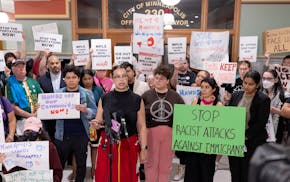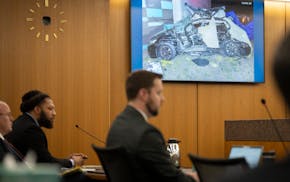St. Paul city, school and state representatives pledged Saturday not to cooperate with federal immigration agents, and an official with the Minnesota Attorney General's Office vowed to fight President Donald Trump on actions he said amounted to "executive overreach."
The remarks came during a forum on immigration safety at Neighborhood House in St. Paul, where dozens gathered to hear public officials discuss how local government is responding to Trump's plans for mass deportations.
City Council President Mitra Jalali said the community is less safe when residents feel they don't have access to basic city services. Amid Trump's crackdown on unauthorized immigrants, she said, "We will make sure that people are safe in every way we can."
Deputy Mayor Jaime Tincher said St. Paul has had an ordinance since 2004 that limits city employees' cooperation with federal immigration enforcement. "That has been our position for a very long time, well before the Trump administration," she said.
Tincher said the city is training front-line employees to know how to deal with U.S. Immigration and Customs Enforcement agents when an incident happens. In that event, senior leaders and attorneys would dispatched to the scene, she said.
Federal officials have not responded to repeated requests from the Minnesota Star Tribune about how many people the St. Paul ICE field office has arrested or deported during Trump's new term. But the agency recently arrested a Mexican national convicted of second-degree assault of a child, according to news reports.
White House press secretary Karoline Leavitt also noted during a news conference last week that the St. Paul ICE field office arrested a Honduran national convicted of fourth-degree criminal sexual conduct with a minor, and a Mexican citizen who was convicted of possessing pornographic material of a child on a work computer.
St. Paul School Board Member Carlo Franco said a school's administrative team checks visitors to see if they are on an approved list. If they say they are with ICE or a law enforcement agency, they aren't just allowed in without question, he said.
Franco said the school board is updating its policies and is working to address protocols for how to handle immigration agents trying to enter the building. For now, he said, school principals are expected to call the district's general counsel office if that happens
Bus drivers have also been directed to not force a student off the bus if the child fears meeting agents at a stop. Franco said the board will provide a list of resources to families so they can feel prepared.
St. Paul resident Larry Lucio, a former educator, said he appreciates what the school district is doing. But there's an assumption, he said, "that all principals and all teachers feel strongly about what we're trying to do. I personally know that that's not true, so I have a lot of concern about the day-to-day activity and process in the schools."
Lucio questioned how schools will handle children who are afraid to show up for school because of immigration enforcement. Franco said the school board is requesting information on student absentee rates in the wake of immigration actions and that the board expects there will be additional training on the issue.
Amid controversy about Trump's executive order seeking to end birthright citizenship, Chief Deputy Attorney General John Keller said that the Supreme Court's interpretation of the law "has been clear, and even with this Supreme Court we are confident that it will remain the law of the land."
Attorney General Keith Ellison joined other Democratic attorneys general in filing a legal challenge in Massachusetts to stop the executive order, and Keller said there would be a hearing on the case Friday.
Less than an hour after the event, a massive rally unfolded at the corner of E. Lake Street and Bloomington Avenue in south Minneapolis to demonstrate against Trump's immigration plans. Thousands of protesters chanted against deportations and vowed they would fight back as a community.
"They think that we're going to sit down and we're going to back down and we're going to be quiet and comply — no, we're not!" said Dieu Do, addressing the crowd while standing on the bed of a truck as they prepared to march down Lake Street.
"We're going to fight back. … We will continue to be in these streets calling an end to mass deportations," Do said. "We will continue to be in these streets calling an end to militarization at the border. We will continue to be out here fighting for all communities and all immigrants."

How the federal raid unified the fractious Minneapolis City Council against Trump, sort of
Trump travel ban 'cruel,' Minnesota advocacy group says

Minneapolis City Council lowers street food cart license fee, hoping fruit sellers will hawk legally

No verdict after first day of jury deliberation in Derrick Thompson murder trial for crash that killed 5

